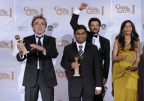
/BBC/ Kate Winslet’s dream of winning an Oscar was one step closer to being realised last night when the English actress won the top two acting Golden Globes and led the British charge on Hollywood’s glittering awards season.
At least eight awards went to British actors and filmmakers – including Danny Boyle’s movie Slumdog Millionaire, which won four awards including the coveted best drama, cementing it as this year’s hottest Oscar contender.
Winslet, whose two wins – for best dramatic actress ( Revolutionary Road) and best supporting actress (The Reader) - were her first Golden Globe awards despite being nominated seven times in the past 12 years, was overcome with emotion on stage.
Wearing a strapless black evening gown, Winslet, 33, dabbed back tears with a tissue. "You have to forgive me because I have a habit of not winning things," she Winslet, before making a lengthy acceptance speech, ending with a tearful thank-you to her husband, the British director Sam Mendes, and a shout-out to her two children watching at home.
Returning to the stage to collect her second award she appeared so overwhelmed she even forgot the name of her fellow nominee, Hollywood star Angelina Jolie: “I'm so sorry … Is this really happening?”
While Winslet proved the queen of the evening, it was Slumdog, the Mumbai-set coming-of-age romance, which proved to be the little film that could when it won all four of its nominated categories including best drama, director (Danny Boyle), screenplay (Simon Beaufoy) and musical score (A.R. Rahman).
The British film, which centres around a boy from the Mumbai slums who goes onto the TV quiz show Who Wants To Be A Millionaire?, is now firm favourite to dominate this year’s Oscars, the nominations of which are announced next month.
Slumdog’s Danny Boyle, fresh from his film’s triumphant five wins at the Critic’s Choice Awards on Thursday night, thanked the Hollywood Foreign Press Association, which hands out the Golden Globes.
“Golden Globes, or the GGs as we very affectionately refer to them — your mad, pulsating affection for our film is much appreciated. Really, deeply appreciated,” said Boyle, who is best known for the 1996 film Trainspotting.
The Australian actor Health Ledger posthumously won the Globe for Best Supporting Actor, following his death in early 2008 from an accidental drug overdose.
He won the award for his critically acclaimed role as The Joker in the Batman film The Dark Knight, beating fellow nominees including Tom Cruise and Robert Downey Jr.
The win sures up Ledger’s chances of being named when the Oscar nominations are announced on January 22 – a year to the day of the young actor’s death.
The movie’s British director, Chris Nolan, accepted the award on his behalf: "All of us who worked with Heath on The Dark Knight accept this with a mixture of awful sadness and incredible pride. After Heath passed on, you saw a hole ripped in the future of cinema."
Other British Golden Globe winners included Tom Wilkinson, 60, who took home an award for Best Supporting Actor in a Miniseries, for his role as Benjamin Franklin in the HBO mini-series John Adams.
Sally Hawkins, 32, beat Meryl Streep to win Best Actress (Musical or Comedy) for her role as an optimistic North London school teacher in Mike Leigh's Happy Go Lucky.
Hawkins, a newcomer to Hollywood's awards scenes, was visibly nervous accepting her prize. “I'll try and get through as much as my voice and nerves and knees will let me,” she said, thanking family, cast mates and collaborators on the film, including director Mike Leigh.
The American actor Mickey Rourke continued his successful comeback by winning Best Actor (Drama) for The Wrestler, and Irish actor Colin Farrell was named Best Actor (Musical or Comedy) for In Bruges, the comedy about Irish hit men.
Steven Spielberg picked up the Cecil B DeMille Award for lifetime achievement.
Last night's Globes are more of an event than usual because of its cancellation in 2008 due to the Writers Guild strike, which shut-down Hollywood for several months.
Nevertheless, the organisers were acutely aware of the potential public relations problem of throwing a multimillion dollar party amid an economic downturn that has resulted in the worst US job losses since 1945.
The after show celebrations were expected to be toned down greatly as a result.
![]()
![]()